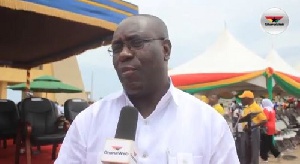 Dr. Anthony Yaw Baah, Secretary General of TUC
Dr. Anthony Yaw Baah, Secretary General of TUC
The Trades Union Congress (TUC) holds the view that tariffs can be reduced by 20% or more.
Expressing support for government’s position to reduce tariffs, TUC said given the negative impact of the existing high tariffs on economic activities and on the living standards of consumers, higher reduction is in the right direction.
“We think a significant reduction in tariffs is justified when we take into consideration the generally low incomes in the country,” TUC said in proposals for tariff review submitted to the Public Utilities and Regulatory Commission (PURC).
While government is promising reductions in electricity tariffs, utility companies are, on the other hand, seeking increases.
The utility companies cited foreign exchange losses as reason for seeking the increment, as most of their inputs are imported, in addition to other reasons such as bills paid in cedis and inflation.
The last tariff review was effected in 2015.
The workers’ union explained that the review should fulfill objectives such as access to reliable and affordable electricity and water, improvement in the quality of service of utility companies, and ensure that utility tariffs reflect prudent cost.
Impact on growth
TUC observed that one major challenge for the growth of the private sector in Ghana has to do with high utility tariffs, adding that it is important that the review takes into account the plight of the domestic private sector, particularly the SMEs.
PURC not to pass on unjustifiable costs
“The utility companies are demanding cost-reflective tariffs. We expect PURC to ensure that unjustifiable costs are not passed on to consumers.
“The resistance to tariff is due, partly, to the fact that consumers are paying for inefficiencies of utility companies, especially costs arising from political decisions that had only served the interest of some political elites,” it added.
TUC wants levies and taxes on electricity scrapped
The proposals tasked government to treat the power sector as a strategic sector whose value lies in supporting economic growth, from which government can derive revenues through taxes.
“In our view, it is wrong for government to use the power sector as a direct revenue-generating source.
“Many Ghanaians are either receiving low incomes or are without any regular income. Therefore, it will be wrong to subject the utility sector to profiteering.
“The TUC expects government to scrap all the levies and taxes on electricity as a means of improving access and making it affordable to all Ghanaians in all parts of the country,” it said.
Demands for clear policy on how to manage utility companies
According to TUC, the assets of the state-owned utility companies are national assets which generate economic returns from the pass-through costs paid by end users.
Consequently, it charged government, as the owner of these assets, to work with PURC to develop a clear policy on how to manage these national assets and the returns they generate.
Changes in existing tariff structure
It demanded that the call for reclassification of existing tariffs should consider the plight of people who can be described as energy poor in order not to worsen the condition of lifeline consumers.
Invest in renewable energy
With the development of improved technologies, the cost of renewable energy, such as solar, has reduced considerably.
For example, solar energy, which used to be 30 to 40 cents/KWh about a decade ago, now hovers around between 3 and 10 cents/KWh.
Increasing renewable energy in the energy mix should be the direction for the generation of electricity.
The union, therefore, urged government to develop a comprehensive policy direction to promote renewable energy in Ghana.
TUC calls for review of Power Purchase Agreements
The TUC called on government to undertake a full-scale review of the existing Power Purchase Agreements to ensure that Ghana gets good value for money to ensure that Ghanaians are not overburdened by excessive tariff increases due to errors committed by politicians who might have served their own interests with such agreements.
Strategies to manage growing demand for electricity
The demand for electricity in Ghana is growing at a rate around 12 percent per annum, which is far above the average demand of about three percent for Africa.
TUC, therefore, stressed the importance of intensifying education on the benefits of demand-side management to ensure that buildings are designed to reduce the use of air conditioners.
TUC calls for abrogation of Teshie Desalination Plant contract
The workers’ union noted that operating the Teshie Desalination Plant is contributing to the debt burden of Ghana Water Company Limited (GWCL), which affects water tariff, generally.
“We would like to add our voice to all those who are calling for the abrogation of the contract.
“The people of Teshie and the surrounding communities should be provided with water from alternative sources,” it said.